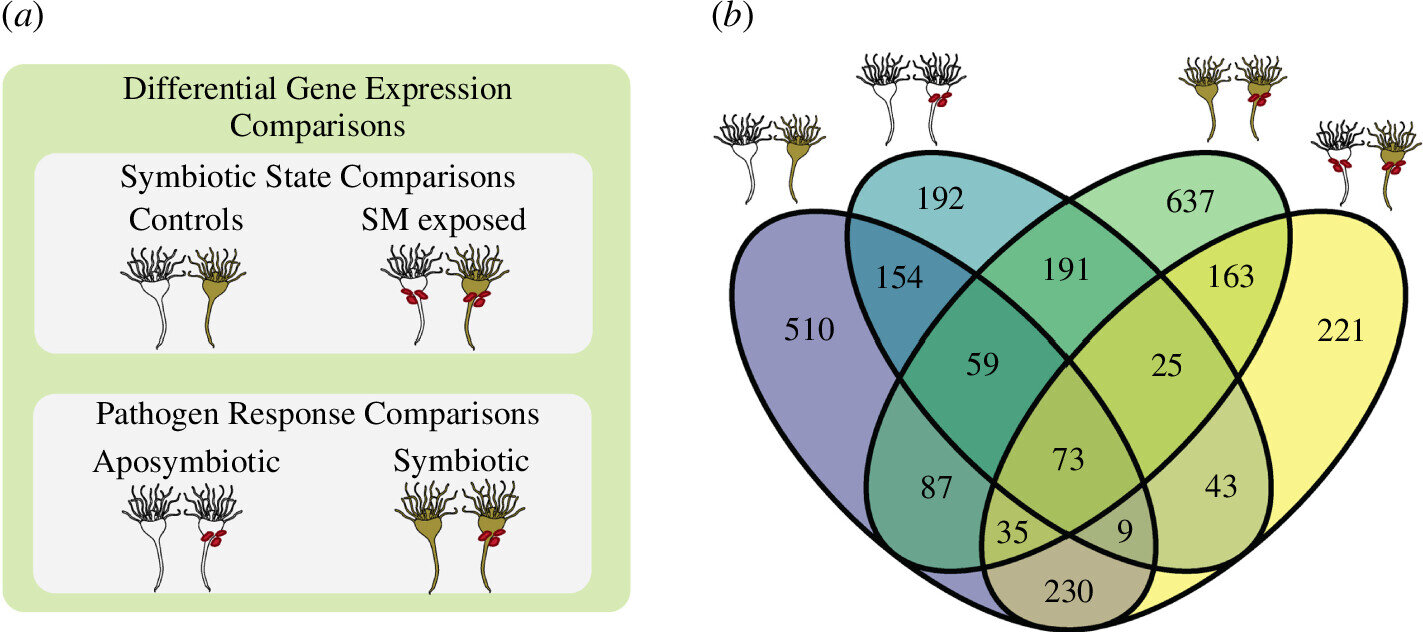Marine animals like jellyfish, corals and sea anemones often live with algae inside their cells in a symbiotic relationship. The animals give the algae nutrients and a place to live; in return, algae give the animals some of the food they make from sunlight via photosynthesis.
While this food production seems great for the jellyfish, the algae can also change its host animal’s immunity, similar to the changes made by human pathogens, like parasites that cause malaria. This side effect of the partnership weakens the jellyfish’s immune system, making them worse at fighting off infections, according to a new study from researchers at The University of Texas at Arlington.
The work is published in the journal Proceedings of the Royal Society B: Biological Sciences.
This research provides answers to how living with symbiotic partners inside animal cells can impact the host animal’s immune system. The findings have important implications for other sea creatures, including endangered corals that are dying at a rapid pace due to various disease outbreaks, the most devastating of which has been stony coral tissue loss disease.
For the project, scientists studied the polyp stage of the upside-down jellyfish, a juvenile life stage. During the polyp stage, jellyfish can live with or without symbiotic algae, setting up a natural experiment. The team exposed two groups of jellyfish polyps to a harmful bacterium, one group of polyps with symbiotic algae and the other without.
“The results were clear,” said Madison Emery, lead author on the study and a UTA alumna who studied in the lab of UTA biology Professor and paper co-author Laura Mydlarz. Dr. Emery is now a postdoctoral researcher at Michigan State University.
“Jellyfish polyps with algae had lower survival rates when exposed to bacteria compared to those without algae,” Emery added. “This means that having symbiotic algae inside their cells makes it harder for the jellyfish to survive infections.”
Taking a closer look at the genes involved in the immune response, the researchers found that polyps with algae had different gene expression activity than those without. This shows that living with algae changes how the jellyfish’s immune system works, making them more vulnerable to bacteria. Researchers believe that the polyps with symbiotic algae are more likely to die due to bacterial infection because their immune response was stronger and with more inflammation, causing more damage to their cells.
“This study is important for coral health and conservation,” said Dr. Mydlarz, who has been researching coral reef disease for years. “Corals, like jellyfish, rely on their relationships with algae to get the food they need to survive. These symbiotic relationships are crucial for the health and survival of coral reefs, which are vital to marine biodiversity and coastal protection.
“Understanding how these relationships affect the immune systems of marine organisms can help scientists develop strategies to protect and restore coral reefs, especially in the face of disease outbreaks and environmental challenges due to climate change.”
More information:
Madison A. Emery et al, Trade-off between photosymbiosis and innate immunity influences cnidarian’s response to pathogenic bacteria, Proceedings of the Royal Society B: Biological Sciences (2024). DOI: 10.1098/rspb.2024.0428
Provided by
University of Texas at Arlington
Citation:
Algae-jellyfish relationship provides insight on immune health (2024, October 30)
retrieved 30 October 2024
from iEC
This document is subject to copyright. Apart from any fair dealing for the purpose of private study or research, no
part may be reproduced without the written permission. The content is provided for information purposes only.
